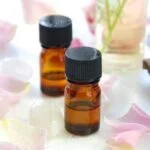The sense of smell, or olfaction, is a powerful tool that connects us to our surroundings and influences our well-being. However, with the emergence of the Covid-19 pandemic, many individuals have reported experiencing anosmia, or loss of smell, as one of the symptoms associated with the virus. This has sparked an interest in exploring alternative therapies such as aromatherapy to address this issue.
Aromatherapy is a holistic healing treatment that uses natural plant extracts, known as essential oils, to promote physical and psychological well-being. The relationship between aromatherapy and the sense of smell is deeply intertwined, making it a promising approach for individuals struggling with Covid-related loss of smell. Understanding the science behind how aromatherapy affects our olfactory system can provide valuable insights into its potential benefits for those affected by anosmia.
As we delve deeper into how Covid-19 impacts the olfactory system, it becomes apparent that incorporating aromatherapy into recovery strategies can play a significant role in helping individuals regain their sense of smell. By exploring different types of essential oils specifically targeted towards loss of smell, individuals may find relief and support in their journey towards recovery.
In the following sections, we will explore the science behind aromatherapy and its connection to the sense of smell amidst the challenges posed by Covid-19.
The Science Behind Aromatherapy and Its Relationship to the Sense of Smell
Aromatherapy is a holistic healing treatment that uses natural plant extracts, known as essential oils, to promote overall well-being. These essential oils are highly concentrated and possess aromatic properties that can have a profound impact on our emotions and physical health.
The sense of smell, also known as olfaction, plays a crucial role in how aromatherapy works. When we inhale the aroma of essential oils, the olfactory nerves in our nose send signals directly to the limbic system in the brain, which is responsible for regulating emotions, memories, and behaviors.
The relationship between aromatherapy and the sense of smell is intricate and powerful. Essential oils have unique chemical compositions that can activate specific receptors in the olfactory system, triggering responses in the brain that can influence our mood, stress levels, and even our immune function. This connection between scent and emotion has been harnessed for centuries in various cultures around the world for therapeutic purposes.
In the context of Covid-19 and its impact on loss of smell (anosmia), incorporating aromatherapy into daily routines can potentially help individuals struggling with this symptom. Essential oils like eucalyptus, lemon, peppermint, and rosemary are known for their invigorating properties that can stimulate the olfactory system and promote a sense of clearness.
By understanding how aromatherapy interacts with our sense of smell at a scientific level, we can explore its potential benefits in addressing issues related to Covid-related loss of smell.
How Covid-19 Impacts the Olfactory System
The Covid-19 pandemic has brought to light various symptoms, one of the most common being the loss of smell, also known as anosmia. This particular symptom has intrigued researchers and healthcare professionals alike, as it is not always a typical feature of respiratory illnesses. Studies have shown that the SARS-CoV-2 virus responsible for Covid-19 can affect the olfactory system directly, leading to a temporary or sometimes long-term loss of smell in affected individuals.
Understanding how Covid-19 impacts the olfactory system is crucial in exploring potential treatment options, such as aromatherapy. Aromatherapy involves using essential oils from plants to promote health and well-being.
The connection lies in the fact that smell plays a significant role in our emotions, memories, and overall perception of life. By leveraging aromatherapy techniques and essential oils, individuals experiencing loss of smell due to Covid-19 may be able to stimulate their olfactory receptors and potentially aid in their recovery process.
Research has shown promising results in using certain essential oils for regaining a sense of smell post-Covid. Essential oils like eucalyptus, peppermint, lemon, and rosemary are known for their aromatic properties that can help clear congestion in the nasal passages and provide a stimulating effect on the olfactory receptors. Incorporating these essential oils into aromatherapy practices may assist individuals in retraining their sense of smell and reconnecting with scents they once enjoyed before falling ill with Covid-19.
| Aromatherapy Essential Oil | Effectiveness |
|---|---|
| Eucalyptus | Clears congestion and stimulates olfactory receptors |
| Peppermint | Provides a refreshing scent for retraining sense of smell |
| Lemon | Invigorates senses and aids in recovering lost sense of smell |
| Rosemary | Stimulates memory recall through its scent therapy benefits |
By delving into the science behind aromatherapy’s relationship with our sense of smell and understanding how Covid-19 impacts this crucial sensory system, individuals can explore alternative methods like aromatherapy to aid in their recovery journey from experiencing anosmia due to the virus.
While further research is needed to fully comprehend the efficacy and long-term effects of aromatherapy on improving loss of smell post-Covid, initial studies show promising results worth considering for those seeking holistic approaches to regain their sense of smell amidst this global health crisis.
Exploring Different Types of Aromatherapy Essential Oils for Loss of Smell
Aromatherapy offers a natural and holistic approach to aiding individuals experiencing loss of smell due to Covid-19. Essential oils have been used for centuries for their therapeutic properties, including their ability to stimulate the olfactory system and potentially support its recovery. When considering aromatherapy for loss of smell, it is important to explore different types of essential oils to find the most effective ones for each individual’s unique needs.
Peppermint Oil
Peppermint oil is known for its invigorating and refreshing aroma, which can help awaken the senses and provide a stimulating effect on the olfactory system. This essential oil may be beneficial for individuals struggling with loss of smell by helping to clear nasal passages and improve overall nasal function. Inhaling peppermint oil through diffusion or topical application may assist in retraining the brain to recognize scents and promote sensory recovery.
Lavender Oil
Lavender oil is often praised for its calming and soothing properties, but it can also play a role in supporting the sense of smell in individuals affected by Covid-related anosmia. The gentle floral scent of lavender can aid in relaxing the mind and reducing stress levels, which are important factors in improving overall sensory perception. Using lavender oil through inhalation or diluted application may help in creating a conducive environment for olfactory healing.
Eucalyptus Oil
Eucalyptus oil is well-known for its respiratory benefits and ability to clear congestion, making it a valuable option for individuals struggling with loss of smell due to Covid-19. The strong, menthol-like scent of eucalyptus can help open up nasal passages and promote easier breathing, potentially aiding in the restoration of the sense of smell over time.
Incorporating eucalyptus oil into aromatherapy practices such as steam inhalation or diluted massage blends can provide both physical relief and olfactory stimulation.
By exploring different types of essential oils like peppermint, lavender, and eucalyptus, individuals experiencing loss of smell from Covid-19 can harness the healing power of aromatherapy to support their olfactory system’s recovery journey. It is essential to consult with a professional aromatherapist or healthcare provider before using any essential oils, especially if dealing with specific health conditions like Covid-related anosmia.
With proper guidance and safe practices, aromatherapy can be a valuable tool in promoting overall wellness during these challenging times.
Case Studies
When it comes to dealing with the loss of smell caused by Covid-19, many individuals have turned to aromatherapy as a way to potentially regain their sense of scent. Aromatherapy involves using essential oils derived from plants to promote physical and psychological well-being. These oils are known for their aromatic properties, which can have a direct impact on our sense of smell.
Here are some real-life experiences of individuals who have used aromatherapy for Covid-related loss of smell:
1. Lavender Oil: One individual shared that using lavender oil in a diffuser at home helped them gradually start sensing different scents again after recovering from Covid-19. The calming effects of lavender also aided in reducing stress and anxiety during the recovery process.
2. Peppermint Oil: Another person mentioned that inhaling peppermint oil directly from the bottle or adding a few drops to a warm bath helped stimulate their olfactory senses post-Covid. The refreshing and invigorating scent of peppermint seemed to awaken their sense of smell gradually.
3. Eucalyptus Oil: A different individual found relief by inhaling eucalyptus oil steam through a facial steam inhaler. They noticed an improvement in their ability to detect various scents after incorporating this practice into their daily routine.
These case studies highlight the potential benefits of using aromatherapy as a complementary approach to dealing with the loss of smell associated with Covid-19. While individual experiences may vary, exploring different essential oils and methods can be worth considering for those looking to support their olfactory system’s recovery journey.
Incorporating aromatherapy into daily routines can provide not only a sensory experience but also potential therapeutic effects that may help in regaining the sense of smell lost due to Covid-19’s impact on the olfactory system.
Aromatherapy Techniques for Rebuilding the Sense of Smell Post-Covid
The sense of smell, also known as olfaction, plays a crucial role in our daily lives by influencing our emotions, memories, and even appetite. However, many individuals who have experienced Covid-19 report a temporary or long-lasting loss of smell, also known as anosmia.
This can significantly impact their quality of life and overall well-being. Aromatherapy, a holistic healing treatment that utilizes essential oils to promote health and well-being, has shown promise in helping individuals rebuild their sense of smell post-Covid.
Aromatherapy works by stimulating the olfactory system through the inhalation of aromatic essential oils. These oils contain volatile compounds that can directly affect the brain’s limbic system, which is responsible for emotions, behavior, and memory. By using specific essential oils that are known for their stimulating properties, individuals recovering from Covid-related loss of smell can potentially retrain their olfactory system and regain their sense of smell over time.
When exploring aromatherapy techniques for rebuilding the sense of smell post-Covid, it is essential to focus on certain key essential oils that are particularly beneficial for olfactory recovery. Some commonly recommended essential oils include rosemary, eucalyptus, peppermint, lemon, and lavender.
These oils are believed to have stimulating properties that can help activate the olfactory receptors and improve sensory perceptions. Engaging in regular aromatherapy sessions with these essential oils may aid in restoring the sense of smell gradually and effectively post-Covid.
| Essential Oil | Benefits |
|---|---|
| Rosemary | Stimulates cognitive function and memory |
| Lavender | Promotes relaxation and stress relief |
| Eucalyptus | Clears congestion and improves breathing |
Tips for Incorporating Aromatherapy Into Your Daily Routine for Overall Wellness
Aromatherapy is a versatile and soothing practice that can offer numerous benefits beyond just the sense of smell. Incorporating aromatherapy into your daily routine can be a wonderful way to promote overall wellness and balance in your life, particularly during challenging times like dealing with the loss of smell due to Covid-19. By harnessing the power of essential oils, you can create a calming and supportive environment for both your physical and emotional well-being.
Creating a Relaxing Atmosphere
One simple way to incorporate aromatherapy into your daily routine is by diffusing essential oils in your living space. Whether you prefer the refreshing scent of peppermint, the calming aroma of lavender, or the uplifting fragrance of citrus oils, diffusing essential oils can help create a relaxing atmosphere to unwind after a long day. Simply add a few drops of your chosen essential oil to a diffuser filled with water and let the natural scent fill your home.
Aromatherapy in Self-Care Practices
In addition to diffusing essential oils, you can also incorporate aromatherapy into your self-care practices for overall wellness. Adding a few drops of essential oils like eucalyptus or tea tree to your bathwater can create a spa-like experience at home while promoting relaxation and rejuvenation. You can also blend essential oils with carrier oils like coconut or jojoba oil for a luxurious massage oil that can help relieve stress and tension in both mind and body.
Mood-Boosting Blends
For those looking to uplift their spirits and enhance their mood, creating custom blends of essential oils can be an enjoyable and personalized way to incorporate aromatherapy into daily life. Combining citrus oils like lemon or orange with floral notes like ylang-ylang or rose can create a brightening blend that helps boost mood and energy levels throughout the day.
Experiment with different combinations until you find one that resonates with you personally, allowing aromatherapy to become an integral part of your daily wellness routine.
Consultation and Safety Precautions
Aromatherapy is a powerful and natural way to address the loss of smell associated with Covid-19. However, it is essential to approach this alternative treatment with caution and under the guidance of a professional aromatherapist. Consulting with a qualified practitioner can help ensure that you are using essential oils safely and effectively to support your olfactory system during this challenging time.
When seeking guidance on aromatherapy for Covid-related loss of smell, it is important to find an experienced aromatherapist who understands the intricacies of scent perception and the potential impacts of essential oils on the sense of smell. A professional will be able to assess your specific situation, taking into account your medical history, allergies, and any existing conditions that could affect your response to aromatherapy. They can provide personalized recommendations tailored to your needs while considering possible contraindications.
Additionally, a trained aromatherapist can help you navigate the vast array of essential oils available for addressing loss of smell due to Covid-19. Different oils have varying properties that can stimulate and support the olfactory system in unique ways.
By working with a professional, you can identify which essential oils are most suitable for your individual circumstances and create a customized blend or treatment plan that aligns with your preferences and goals for olfactory recovery after experiencing Covid-related loss of smell.
Conclusion
In conclusion, the use of aromatherapy has shown promising potential in alleviating the loss of smell experienced by individuals affected by Covid-19. The sense of smell plays a crucial role in our overall well-being, as it impacts our mood, memory, and even our appetite. When Covid-19 disrupts this sense, it can be distressing for many individuals. Aromatherapy offers a natural and holistic approach to support the olfactory system’s recovery and provide relief during this challenging time.
Research has indicated that certain essential oils used in aromatherapy can stimulate the olfactory system and potentially aid in regaining the sense of smell post-Covid. By understanding the science behind how aromatherapy interacts with our sense of smell, individuals can explore various essential oils that may help them on their journey to recovery. Whether through inhalation or topical application, incorporating aromatherapy techniques into daily routines can have a positive impact on overall wellness and emotional well-being.
As we navigate through the lingering effects of Covid-19, it is essential to approach aromatherapy for loss of smell with caution and seek guidance from professionals in the field. Consulting with an aromatherapist can provide personalized recommendations tailored to individual needs and ensure safety precautions are observed. By harnessing the healing power of aromatherapy, individuals affected by Covid-related loss of smell can find comfort, support, and hope in their journey towards regaining this vital sensory function once again.
Frequently Asked Questions
Does Aromatherapy Work With No Sense of Smell?
Aromatherapy involves inhaling essential oils to stimulate the sense of smell, so it may not be as effective for individuals with no sense of smell. The olfactory system plays a crucial role in how aromatherapy works, making it difficult to experience its full benefits without the ability to smell.
How Do I Regain My Sense of Smell After Covid?
Regaining your sense of smell after Covid can be a gradual process that varies from person to person. Some strategies that may help include smelling strong scents like eucalyptus or essential oils, practicing breathing exercises, and consulting with a medical professional for guidance on potential treatments.
How Do You Reverse Covid Loss of Smell?
Reversing the loss of smell caused by Covid can be challenging, but seeking treatment from a healthcare provider is essential. Potential interventions may include corticosteroids, nasal irrigation, olfactory training, and vitamin supplements. Patience is key as recovery timelines differ for each individual affected by anosmia.

Are you looking for a natural way to improve your health and wellbeing?
If so, aromatherapy may be the answer for you.





